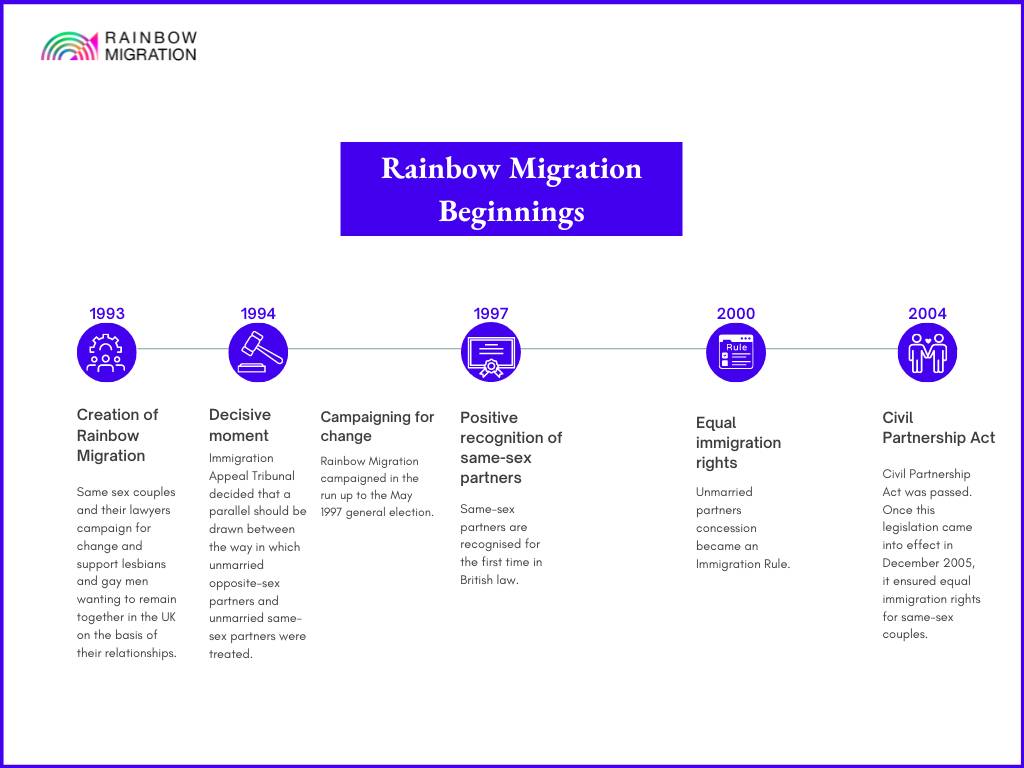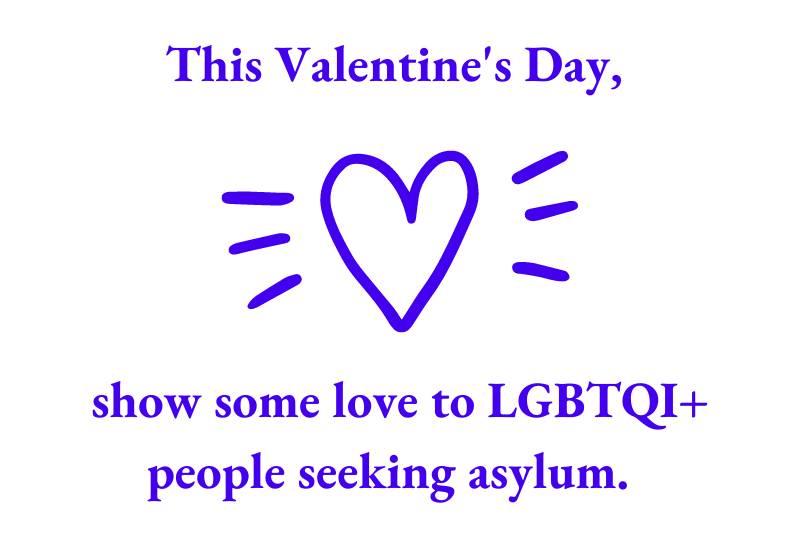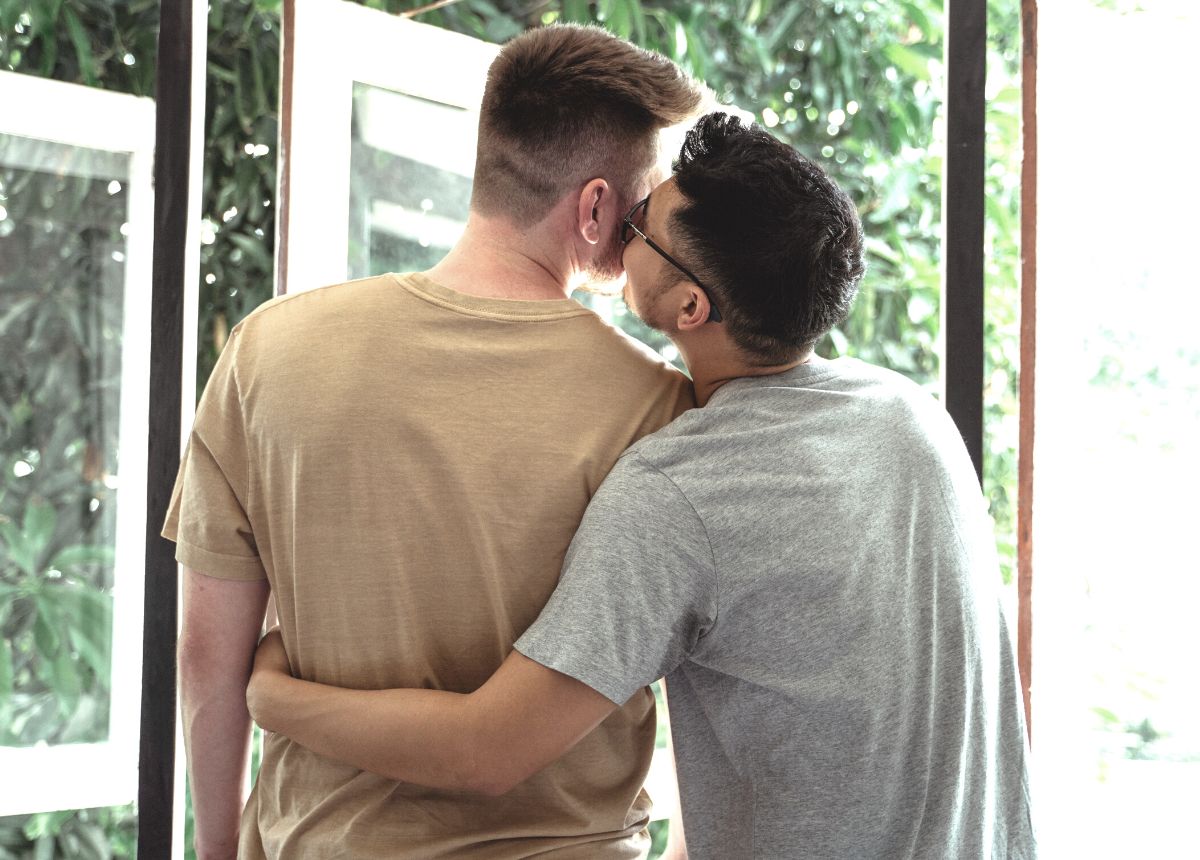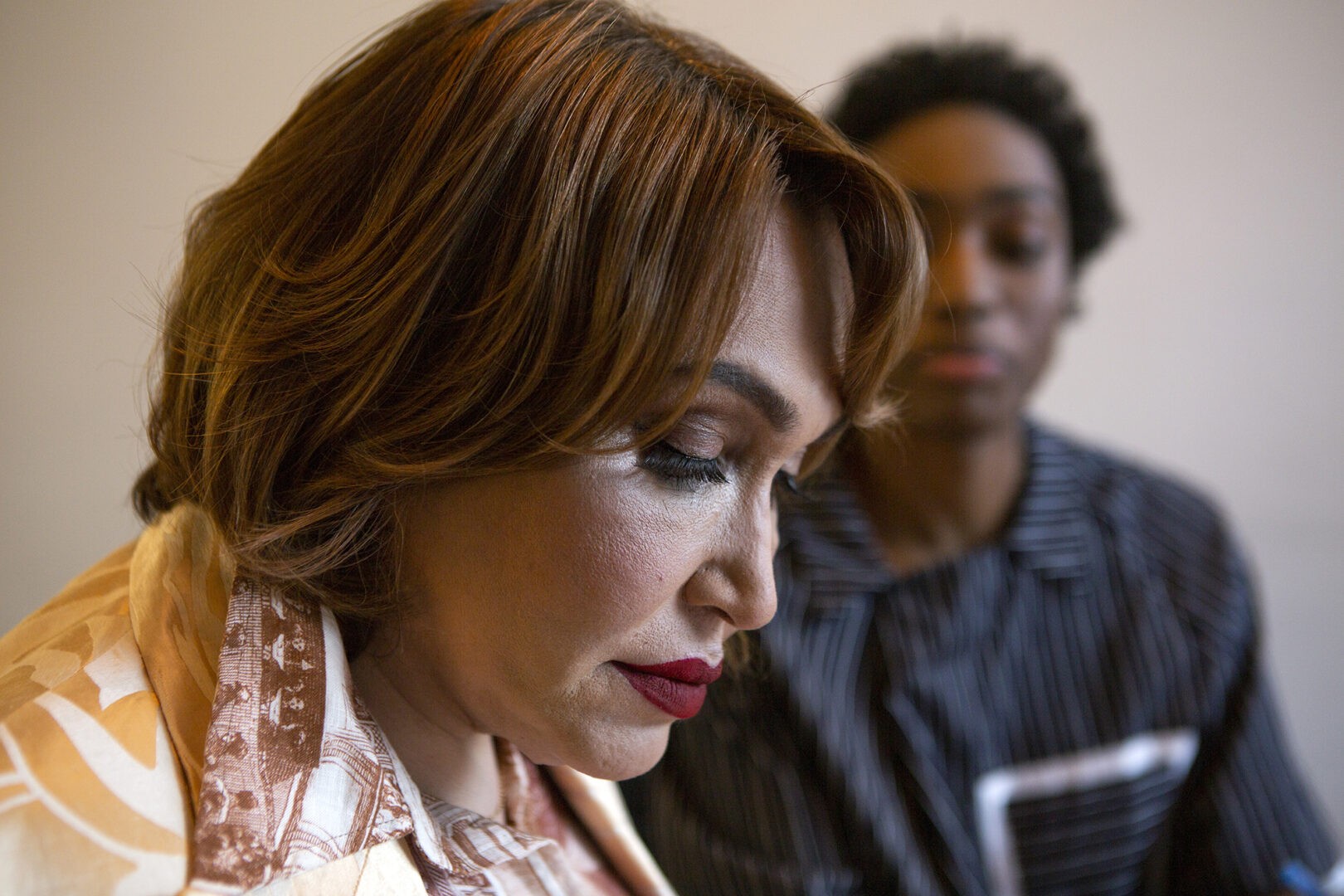LGBTHM: The beginnings of Rainbow Migration
LGBT History Month is a chance to celebrate key moments in the history of LGBTQI+ people in the UK, but also a time to reflect and keep sounding the alarm on the discrimination and challenges that LGBTQI+ people face just to be who they are.
This year, we wanted to share the beginnings of Rainbow Migration and the first big immigration rights achievement that we were able to celebrate back in 1997, while also reminding everyone that a cruel #AntiRefugeeBill is being passed through Parliament at the moment. If it becomes law, more LGBTQI+ people will be refused sanctuary here and sent back to countries where they will be persecuted and their lives will be at risk. Learn more about the dangerous Bill and how you can take action today.
The creation of Rainbow Migration, 1993
Rainbow Migration was created in 1993 as the Stonewall Immigration Group by same sex couples and their lawyers to share information, campaign for change and support lesbians and gay men wanting to remain together in the UK on the basis of their relationships.
Organised more effectively as a group, more and more people made applications for a partner to be granted leave to remain in the United Kingdom.
The effort and resilience of couples prepared to fight difficult legal battles, together with lawyers who used every available legal and political method to pursue their clients’ cases resulted in a number of significant successes.
A decisive moment in 1994
In 1994, the Immigration Appeal Tribunal decided that a parallel should be drawn between the way in which unmarried opposite-sex partners and unmarried same-sex partners were treated. From that moment on, despite resistance, there were several more successful applications by same-sex couples.
Campaigning for change: 1994 – 1997
Rainbow Migration campaigned in the run up to the May 1997 general election, successfully obtaining the commitment of the Shadow Home Secretary that if elected, a Labour government would recognise same-sex relationships for immigration purposes.
In 1997, same-sex partners are recognised for the first time in British law
In October 1997, the Unmarried Partners Concession was announced. It was the very first positive legal recognition of same sex relationships in British law. The concession made it possible for same-sex couples to make an application for the foreign partner to remain in the United Kingdom if they had lived together for four years.
Equal immigration rights, 2000
In October 2000, the unmarried partners concession became an Immigration Rule, which is of far more legal significance than a concession.
Civil Partnership Act, 2004
Finally, in November 2004 the Civil Partnership Act was passed. Once this legislation came into effect in December 2005, it ensured equal immigration rights for same-sex couples.
Expanding our area of work
After this victory, at Rainbow Migration we expanded our area of work to support all LGBTQI+ people who wanted to stay in the UK because they were afraid of persecution in their home countries.
If you’d like to find our more about us, you can learn more about the work that we do or the ways in which we support LGBTQI+ people seeking asylum.
This Valentine's Day, show some love to LGBTQI+ people seeking asylum.
We should all be free to show our love for one another today, but for many LGBTQI+ people seeking asylum here that’s just not possible.
Some will have been placed in immigration detention, where they face discrimination, harassment and violence if their sexual orientation is or gender identity discovered. Others will be sent back to countries where they could be persecuted or killed, because they have been unable to “prove” that they are LGBTQI+.
The Government’s #AntiRefugeeBill will make this so much worse, placing more LGBTQI+ people in unsafe institutional accommodation that is like detention, and raising the bar for people trying to prove they are LGBTQI+.
That’s why, this Valentine’s Day, we’re asking MPs to show some love for LGBTQI+ people fleeing persecution, by promising to defend LGBTQI+ asylum when the #AntiRefugeeBill returns to the House of Commons.
Will you help by tweeting your MP on Monday 14 February?
Simply:
- Find your MP’s Twitter handle
- Open a draft tweet
- Copy the message below into the draft tweet after your MP’s Twitter handle
- Your message will automatically include the valentines image below if you keep the “pic.twitter” link at the end.
- Tweet away!
Tweet:
We should all be free to show our love today, but for many LGBTQI+ people seeking asylum here that’s not possible. The #AntiRefugeeBill will make it much worse. As my MP please defend LGBTQI+ people when the Bill returns to the Commons pic.twitter.com/tE8S6UyQry

Having to “prove” that you are LGBTQI+
At present, when an LGBTQI+ person claims asylum, they have to “prove” their sexual orientation or gender identity to the satisfaction of the Home Office or judges.
They need to demonstrate that there is a “reasonable degree of likelihood” of persecution if they were returned to their country of origin.
This low standard of proof reflects the seriousness of getting this wrong – if an LGBTQI+ person is disbelieved and wrongly returned to their country of origin, their life could be at risk.
If the #AntiRefugeeBill passes, the standard of proof will be higher and people will have to prove they are LGBTQI+ “on the balance of probabilities”. More LGBTQI+ people in need of our protection will be refused asylum and returned to countries where they face imprisonment, torture or death.
Stand with all LGBTQI+ people in need of protection. Please share this video below and help us spread the word.
Signed statement: safe routes, compassion and fairness need to be at heart of Government’s approach to people seeking sanctuary
Following the tragic deaths of at least 27 people in the English Channel – including children – it is time for serious action. We cannot stand by and let this Government’s harsh rhetoric and ill-thought-out approach go unchecked.
This Government’s policy of grabbing cheap headlines and blaming the French authorities while paying them millions of pounds to build fences around the Channel ports has not worked. Now people fleeing conflict, persecution and war have paid the ultimate price. We know from the warehouses overflowing with donations for Afghan refugees that the public believes in the right to seek safety. That same public cannot stand for this.
Instead of trying to blame people seeking safety for its own failures, this Government must step up to its responsibilities and focus on saving lives.
For a start, parliamentarians must rethink the Nationality and Borders Bill. Not only will these new laws take a wrecking ball to the very principle of refugee protection, but we know they are unworkable. They will push desperate people further into the arms of smuggling gangs and will only inflame our international partners who we need to work with to ensure people seeking sanctuary can do so safely.
We also need a cast-iron commitment from this Government that it will not pursue its policies on offshoring or pushbacks, which will cause even more harm and make deaths in the Channel even more likely.
Above all, this tragedy shows how urgent it is for this Government to work with its international partners to create more routes to safety for refugees. This Government demands refugees take official routes, but for most people, these simply do not exist. Refugees are left with little option but to arrive here hidden in a plane or lorry or crammed onto a small boat.
We are calling on this Government to make a long-term commitment to:
- create a compassionate asylum system that treats all people seeking asylum in the UK with kindness and dignity
- resettle at least 10,000 refugees each year from around the world
- reinstate the Dubs Agreement to protect child refugees from exploitation
- expand family reunion so that more people can be reunited with their loved ones
- introduce a humanitarian corridor
We ask the Government to sit down with people who’ve gone through the asylum system, and their advocates, to create a new, more compassionate, and effective process which puts safety first. Now, if ever, is the time to do so.
Signed by
Barrow Cadbury Trust, Dame Sara Llewellin DBE
Ben & Jerry’s, Rebecca Baron, European Head of Activism
Refugee Action, Tim Naor Hilton, CEO
Refugee Council, Enver Solomon, CEO
Freedom From Torture, Sonya Sceats, CEO
Scottish Refugee Council, Sabir Zazai, CEO
Asylum Matters, Andrea Vukovic & Paul Hook, Co-directors
Abigail Housing, Amanda Church-Mcfarlane, Co-Chief Executive Officer
Action for Refugees in Lewisham, Sophie Wickham, Director
ACH, Fuad Mahamed, CEO
Allies for Justice, Steven Shyaka, Lived experience campaigns coordinator
Amber Film and Photography Collective Laura Laffler, Director
Art Refuge, Bobby Lloyd, CEO
Asylum Aid, Ian Kane, Legal Services Manager
Asylum Link Merseyside, Ewan Roberts, Centre Manager
Asylum Support Appeals Project
Asylum Welcome, Mark Goldring, Director
AVID (Association of Visitors to Immigration Detainees), Ali McGinley, Director
Baca, Jimmy Zachariah, CEO
Bail for Immigration Detainees, Annie Viswanathan, Director
Big Leaf Foundation, Evie Booton, Campaigns Coordinator
Birmingham City of Sanctuary, David Brown, Chair
Birmingham Schools of Sanctuary, Barbara Forbes, Coordinator
Baobab Centre For Young Survivors in Exile, Jodie Bourke, Senior Manager
Boaz Trust, Ros Holland, Chef Executive
Body & Soul, Emma Colyer, Director
Bradford City of Sanctuary, Will Sutcliffe, Chair
Breaking Barriers, Matthew Powell, CEO
Bristol Defend the Asylum Seekers Campaign, Jo Benefield, Coordinator
Bristol Reclaiming Independent Living (BRIL), Mark Williams, Founder
British Association of Social Workers, Dr Ruth Allen, Chief Executive
Bromsgrove and Redditch Welcome Refugees, Yvonne Rendell, Chair
Calais Action, Libby Freeman & Caroline Gregory, Founder
Cambridge Convoy Refugee Action Group, Catharine Walston, Chair of Executive Committee
Campaign Bootcamp, Sarah Miguel, Co-Leader
CARAS, Eleanor Brown, Director
Care4Calais, Clare Moseley, Founder
Caritas Diocese of Shrewsbury, Ben Gilchrist, CEO
Carlisle Key, Diana Vlad & Iain McNee, Housing Support Officer and Operational Manager
Channel Rescue, Kim Bryan, Co-founder
Choose Love, Cherno Jagne, COO
Citizens of the World Choir, Becky Dell and Matilda James, Musical Director and Exec Producer
City of Sanctuary Sheffield, Tom Martin, Director
City of Sanctuary UK, Sian Summers-Rees, Chief Officer
Civic Leicester, Ambrose Musiyiwa, Facilitator
Children England, Chloë Darlington, Policy and Communications Manager
Common Space Common Humanity, Dave Plumb, Coordinator
Compass Collective, Leah Gayer, Co-director
Coventry Refugee and Migrant Centre, Toni Soni, Centre Director
Curious Monkey, Zoe Connel, Project Coordinator for Arriving
Detention Action, Bella Sankey, Director
Doctors of the World, Ellen Waters, Director of Development
Donate4Refugees, Amber Bauer, Founder
ECPAT UK (Every Child Protected Against Trafficking), Patricia Durr, CEO
Equanicity, Cryton Chikoko, Co-founder
FAST (First Aid Support Team), Nynke van Dijck, Founder
Fences & Frontiers, Lewis Garland, Founder / Chair
FODI (Sunderland), Steve Newman, Chair
Good Chance Theatre, Naomi Webb, Executive Director
Govan Community Project, Traci Kirkland, Head of Charity
Greater Manchester Immigration Aid Unit, Denise McDowell, Chief Executive
Haringey Migrant Support Centre
Hastings Community of Sanctuary, Jane Grimshaw & Polly Gifford, Co-Chairs
Hay Brecon and Talgarth Sanctuary for Refugees , Ailsa Dunn, Secretary
Helen Bamber Foundation, Kerry Smith, CEO
Herne Hill Welcomes Refugees, Terry Morin, Chair
Herts for Refugees, Angus Clark, CEO
Homeless Network Scotland, Maggie Brunjes, Chief Executive
Hope for the Young, Matt Blacker, CEO
HOPE not hate, Nick Lowles, CEO
Hope Projects, Phil Davis, Director
Host Nottingham, Rebecca Kogan, Project Coordinator
Humans for Rights Network, Maddie Harris, Director/Founder
IMIX, Emma Harrison, CEO
Immigration Law Practioners’ Association, Nicole Francis , Chief Executive
Interfaith Scotland, Maureen Sier, Director
JRS UK, Sarah Teather, Director
Justice and Peace Scotland (Catholic) Bishops’ Conference of Scotland, Jill Kent
Justice First, Jason Hussein, Project Manager
Kids in Need of Defense UK (KIND UK), Katie Fennell, National Coordinator
KRAN, Dr Razia Shariff, CEO
Latin American Women’s Rights Service, Elizabeth Jiménez-Yáñez & Dolores Modern, Policy co-coordinators
Leeds Destitute Asylum-seekers Support, Jenny Willison, Trustee
Lewisham Refugee and Migrant Network, Rosario Guimba-Stewart, Chief Executive
Liberal Democrats for Seekers of Sanctuary, John Skipworth, Chair of Council
Liberty, Martha Spurrier, Director
LOSRAS (Lewes Supports Refugees), Gill Tipping, Co-Chair
Love Welcomes, Abi Hewitt, CEO / Founder
Love 146, Philip Ishola, CEO
Malvern Green Space
Methodist Church, Geoff Charlton, Local Preacher
Micro Rainbow, Sebastian Rocca, CEO
Migrant Destitution Fund, Sian Mullen, Action Group Member
Migration Mobilities Bristol, Bridget Anderson, Director
Migrants’ Rights Network, Fizza Qureshi, CEO
Migrant Voice, Nazek Ramadan, Executive Director
NACCOM, Bridget Young, Director
NATECLA, Rachel Öner, Co-Chair
Norfolk Schools of Sanctuary, Jake Rose-Brown, Founder
North East Law Centre, Rachel McPeake, Project Administrator
Nurses United UK, Anthony Johnson, Registered Nurse and Lead Organiser
O’s Refugee Aid Team, Onjali Rauf, Founder and Author
Open Aye, Becky Duncan, Director
Our Second Home, Amos Schonfield, Director
Pathways Trust, Tara Pollitt, Operations Manager
Pollination, Yasmine Balfour-Lynn, Co-Founder
Praxis, Sally Daghlian OBE, CEO
Race Equality Foundation, Jabeer Butt OBE, CEO
Rainbow Home (North East England), Alessandra Mondin, Project worker
Rainbow Migration, Leila Zadeh, Executive Director
RAMFEL, James Tullett, CEO
Reading City of Sanctuary, Maggie Filipova Rivers, Manager
Reading Refugee Support Group, Nick Harborne, CEO
RefuAid, Anna Jones, Co Founder
Refugee Action, Lizzie Hobbs, GPP Team Administrator
Refugee Education UK, Catherine Gladwell, Chief Executive
Refugee Legal Support (RLS), Efi Stathopoulou, Programmes Manager
Refugee ReSETTLEment, Paul Kelly, Project leader
Refugee support East London and Essex, Pam Derwin, Admin
Refugee Survival Trust, Elaine Cameron, CEO
Refugee Trauma Initiative, Zarlasht Halaimzai, CEO and Co-Founder
Restore (a project of Birmingham Churches Together), Jeremy Thompson, Manager
Right to Remain, Lisa Matthews
Room to Heal, Elli Free, Director
Routes, Daisy Jacobs & Leyla McLennan, Co-directors
Royal College of Nursing, Geoff Earl, Council Member (personal capacity)
Runnymede Trust, Alba Kapoor, Senior Policy Officer
Rural Refugee Network, Nadia Potts, CEO
Safe Passage, Beth Gardiner Smith, CEO
Samphire, Indre Lechtimiakyte, Legal and Migrant Support Manager
Say It Loud Club, Aloysius Salle, Executive Director
Screen Share UK, Moses Seitler, Director
Scotswood Garden, Karen Dobson, CEO
Seeking Sanctuary, Phil Kerton, Co-Director
Settle Area Refugee Support, Angie Pedley, Treasurer
Social Workers Without Borders, Naomi Jackson
Solidarity With Refugees, Ros Ereira , Director
Sophie Hayes Foundation, Red Godfrey-Sagoo, CEO
Southampton & Winchester Visitors Group, Chris Stephens, Chair of Trustees
Southampton Action, Nikki Walters, Chair
Stand for All, Daniel Sohege, Director
Stories of Hope and Home, Stephanie Neville, Project Manager
Student Action for Refugees, Emily Crowley, Chief Executive
Swindon City of Sanctuary, Nicola Wood, Charity Manager
Tees Valley of Sanctuary, Suzanne Fletcher, Housing Co-ordinator
The Cotton Tree Trust, Janet Gilbert, General Manager
The Iona Community, Robert Swinfen, Convenor of Migration & Asylum Network
The Jewish Council for Racial Equality (JCORE), Dr Edie Friedman, Executive Director
The Mercy Hub, Jeremy Cain, Coordinator
The Pickwell Foundation, Susannah Baker, Founder
The Refugee Rights Project, Izzy Hughes, Founder
The William Gomes Podcast, William Gomes, Director
the3million, Nicolas Hatton, CEO
Together with Migrant Children, Nick Watts & Jane Goldsmid, Co-Directors
Trauma Foundation South West, Judy Ryde, Founder/Clinical Director
UKCEN, Claudia Holmes, Founder
Vauxhall Community Law and Information Centre, Siobhan Taylor-Ward, Solicitor
Voices in Exile, Mel Steel, Director
Voices Without Borders, Joss Duncan & Ewa Lelontko, Co-founders
Waging Peace, Maddy Crowther & Sonja Miley, Co-Executive Directors
West Cumbria Refugee Support Network, Kelly Davis, Chair
West End Refugee Service, Hannah Barnes, Director
Women for Refugee Women, Alphonsine Kabagabo, Director
Young Roots, Jo Cobley, CEO
Doncaster Conversation Club, Jan Foster, Trustee
Skipton Town of Sanctuary, Alan Hickman, Town Councillor
Green Kordofan, Raga Gibreel, Director
Refugees for Justice, Dylan Fotoohi, Director
Entraide (Mutual Aid), Felix Kupay, Chair
South Yorkshire Migration and Asylum Action Group, Stuart Crosthwaite, Secretary
Faversham and Villages Refugee Solidarity Group, Clarissa Hanna, Chair
Kent Kindness, Jo Taylor, Chair
Harrogate district of sanctuary, Pat Ki, membership secretary
Birch Network, Dr Andrew Jolly, Chair of Trustees
FreedVoices, Chibong Lucas,
Refugee Women of Bristol, Layla Ismail, Development Manager
Making Rights Real, Clare MacGillivray, Director
St Chad’s Sanctuary CIO, Abigail Martin, Project Manager
Flintshire City of Sanctuary, Maire Greaney, Secretary & Trustee
Destitution Project Bolton, Shaheda Mangerah, Senior Caseworker for asylum seekers & refugees
D6: Culture in Transit, Clymene Christoforou, Director
Southeast Integration Network, Ruth Cape, Development Manager
Refuweegee, Selina Hales, CEO
Herefordshire City of Sanctuary, Jeff Beatty, Chair.
Windrush learnings: Not much progress toward a fairer and more compassionate asylum system
The Windrush scandal exposed systemic Home Office failures that caused financial loss and emotional distress to many people. There are significant parallels between the Windrush nightmare and the suffering of others who experience the UK asylum and immigration systems.
We have submitted our perspective on the progress that the Home Office has made against the Windrush recommendations to a parliamentary inquiry. Here’s a summary:
- Rushed and inaccessible consultation process: The New Plan for Immigration consultation ran for less than two months (24 March2021 to 6 May 2021) and stakeholders raised concerns about the inaccessibility of the consultation to those people who are in or have been through the asylum process. Attempts to include people with lived experience in the process were an afterthought and those meetings only took place after the consultation had closed. It is therefore unclear to what extent the responses were considered when drafting the subsequent Nationality and Borders Bill, which had its first reading in parliament only [insert amount of time] after the consultation period ended.
- Willingness to improve practice in LGB asylum interview training: We welcomed the Home Office consulting us on the LGB asylum interview training, which they did earlier this year.
- Raising the standard of proof isn’t in line with “a more compassionate approach”: Our concerns about the proposal in the Nationality and Borders Bill to raise the standard of proof for proving someone is LGBTQI+ have been acknowledged by this government, but we were disappointed to learn that the Home Office would only “review and update the training and guidance provided to decision-makers”. More detailed questioning will not resolve this issue.
- Risks of indirect discrimination and lack of evidence for the new Bill: The government’s Equality and Impact Assessment for the Bill agrees that there is a risk of indirect discrimination yet the only proposal is to address it is to provide “training and guidance. The Home Office already has training and guidance on different areas but this has frequently not been enough to resolve issues such as using delay in claiming asylum as a reason for disbelieving someone’s sexual orientation or gender identity. Furthermore, more monitoring data on LGBTQI+ people in the asylum system is needed.
- External views not always considered: Although the Home Office set up a stakeholder group to discuss and try to resolve the issues around access to legal advice for people seeking asylum, we don’t believe views have been taken into consideration during the consultation process and the drafting of the Nationality and Borders Bill.
- Insufficient willingness to enact positive change: We believe that there is willingness by many within the Home Office to improve, however their ability to enact positive change seems to be constrained by those more senior to them.
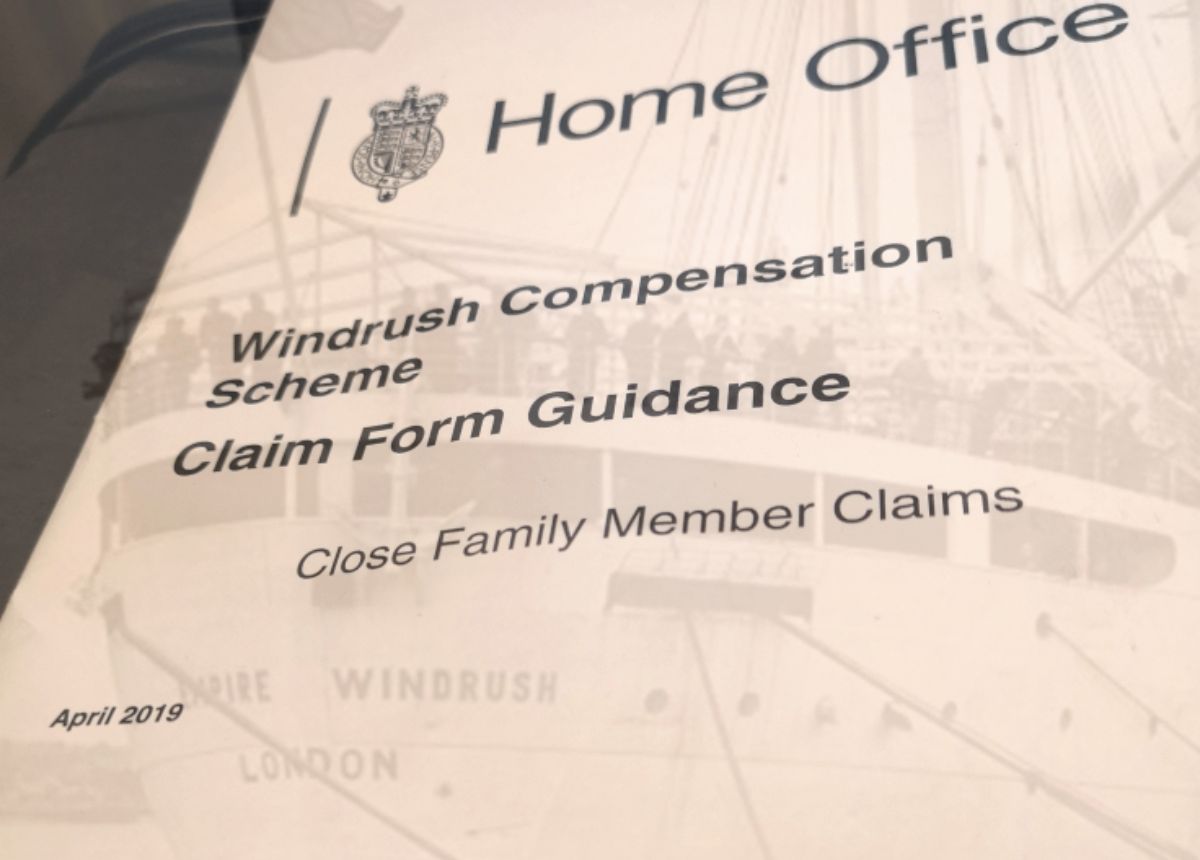
Home Office failing LGB asylum applicants
A new report published this week has found that Home Office targets are preventing asylum decision-makers from adequately assessing claims based on sexual orientation.
The report by the Independent Chief Inspector of Borders and Immigration reveals that an internal Home Office review in 2019 found that there had been a widespread failure to gather the information needed to enable a robust decision to be made LGB asylum claims.
The review also highlighted that claims based on sexual orientation can require an extensive interview or a longer period of analysis and reflection than other cases in order to reach a decision, but that this was being hampered by weekly productivity targets for staff.
In addition, the Chief Inspector found decision records showing a lack of consideration of the fact that not every LGB person who is seeking asylum is comfortable or able to express their emotions articulately, including to a decision-maker who they don’t know or through an interpreter.
Evidence provided by stakeholders and included in the report suggest that too often LGBTQI+ claims are held to a higher standard of proof than the “reasonable degree of likelihood”, which is required in asylum claims at the present time.
An internal review by the Home Office in 2020 had similarly concluded that improvements were needed in application of the standard of proof.
We warned that the Nationality and Borders Bill, which is making its way through parliament, will increase the standard of proof to a higher level of “balance of probabilities”, meaning that that LGBTQI+ people will face an even higher hurdle than they currently do to “prove” their sexual orientation.
Our Executive Director, Leila Zadeh said “as the Nationality and Borders Bill is discussed in parliament, this report is a timely reminder of how incredibly difficult it already is for LGBTQI+ people who are fleeing persecution to ’prove’ who they are in order to get safety in the UK”, and added, “if the Bill passes with this clause, more LGBTQI+ people will be refused asylum and face return to countries where they will be persecuted and their lives will be at risk”.
Open letter to the Foreign Secretary regarding the safety and security of LGBTQI+ Afghans
Dear Foreign Secretary,
We are writing to you with great urgency regarding the safety and security of LGBTQ+ people in Afghanistan who have contacted us and who need protection and safe passage to the UK.
LGBTQ+ people in Afghanistan and their contacts have been reaching out to us at great risk given their vulnerability under the Taliban. We also know that these members of our community are not an exception. We are aware of other LGBTQ+ Afghans who have been seeking the support of civil society in both Australia and the USA. All of these individuals share a grave fear of being early targets of the new regime simply because they are LGBTQ+.
LGBTQ+ Afghans need our support. But they will not be able to benefit from the Government’s evacuation programme unless they receive targeted support.
We write today to call for your leadership in creating the conditions needed for LGBTQ+ Afghans to be evacuated. We request an urgent meeting to share our
insights and support you and your teams to develop an appropriate response that includes LGBTQ+ Afghans as a priority group for assistance immediately.
Humanitarian corridors
Like all those seeking to flee, it is clear that robust security efforts are needed for vulnerable people to be able to leave the country to seek safety.
For this reason, we are calling on this government to work in concert with other aligned Governments to open humanitarian corridors for the evacuation of LGBTQ+ people, similar to corridors used by the UK Government in other emergency contexts such as Uganda or the former Yugoslavia. We fear that the withdrawal of those secure passages at an early date leaves no further opportunity for ensuring the security of vulnerable communities, including LGBTQ+ Afghans.
Civil society outside of Afghanistan who are already in touch with those trying to leave could support LGBTQ+ Afghans to make a case for evacuation securely
immediately, enabling them to leave the country while it remains possible.
Resettlement
We recognise and welcome the bilateral efforts of the UK in quickly establishing the resettlement programme, but share concerns that the scale of the planned programme does not come close to meeting the protection need. We applaud the government’s commitment to resettling those most vulnerable and we look for your assurances that this will include LGBTQ+ people. It is essential for UNHCR to work with LGBTQ+ civil society organisations to ensure this happens and that any screening process takes this into account the fact that LGBTQ+ people who flee will not be able to readily disclose and evidence their sexual orientation or gender identity.
We hope to meet you urgently to discuss how we can implement support for LGBTQ+ Afghans.
Yours sincerely,
Leila Zadeh (Executive Director, Rainbow Migration)
Nancy Kelley (Chief Executive, Stonewall)
Our response to the 'cold-hearted and cruel' Nationality and Borders Bill
Today the government announced changes to the asylum system, which include proposals such as:
- Housing people in overseas reception centres while their asylum claim is being processed
- Requiring claims to be made immediately on arrival and all evidence to be submitted at the beginning of the asylum process
- Forcing people in detention centres who want to appeal decisions to refuse them refugee protection to go through a rushed process
- Curtailing the right to challenge decisions refusing refugee protection
Responding to the government’s proposals, Leila Zadeh, Executive Director of Rainbow Migration, said:
“It’s already difficult for LGBTQI+ people who are fleeing persecution to get safety in the UK, and these cruel proposals will make it even harder. Many of them will have been hiding their sexual orientation or gender identity for a long time, and this government is asking them to overcome a lifetime of discrimination and fear to disclose that they are LGBTQI+ to a complete stranger immediately on arrival in a new country and expecting them to provide evidence at the same time.”
“Being shipped off to processing centres abroad will be tantamount to torture for LGBTQI+ people. As a form of institutional accommodation for large numbers of people, these centres will be fertile ground for homophobia, biphobia and transphobia to run rampant. The people housed there will be even more isolated and at risk, and unable to receive any support from charities like us.”
“Keeping people in such a dangerous environment will force them into the closet for their own protection. That doesn't help when you have to ‘prove' you are LGBTQI+ in order to be granted protection. This essentially amounts to a double punishment for LGBTQI+ people seeking safety."
“These proposals make an already ineffective and inhumane system even more cold-hearted and cruel. This government should focus on creating a kind and compassionate asylum system, rather than on causing further distress to people who are only looking for a place to live in safety and dignity.”
The UK Gay and Lesbian Immigration Group is now called Rainbow Migration
On International Day Against Homophobia, Transphobia and Biphobia, we are excited to announce our new name: Rainbow Migration.
Our new brand marks a new period in our future, while focusing on the issues that matter most to us: supporting LGBTQI+ people through the asylum and immigration system.
Over the past 28 years, we have helped thousands of LGBTQI+ people live safe and fulfilling lives in the UK. However, our former name no longer reflected who we are as an organisation that welcomes all of the LGBTQI+ community. In Rainbow Migration and in the warm and vibrant colours of our new brand, we have found a name and visual identity that reflects what we do and who we are, and embraces all the communities that we work for and support.
Alongside our new name and logo – which have been developed over the past two years with extensive consultation with over 500 supporters and stakeholders – we are launching our brand new website. We hope you will find it easier to use and full of valuable information for LGBTQI+ people seeking asylum and couples making immigration applications.
Our new logo combines two themes: a rainbow and an arrow. The rainbow is a symbol of freedom in many cultures and reflects the idea of hope and possibilities that are out there. It is also the most widely recognised LGBTQI+ symbol in the world. The arrow symbolises migration and movement. It is also a nod to our previous logo, linking the old with the new.
These two powerful symbols together reflect the story of Rainbow Migration – we are proud to be an organisation that supports LGBTQI+ people on their journey to a new life. We are ready to move forward, inspired by our fresh look and our new name.
LGBTQI+ People Seeking Asylum and HIV: ‘I’d rather deal with a real elephant!’
We work with people from all around the world and wellbeing is the focus of our support services. Everyone has a different experience of HIV but a common theme has been that HIV support and prevention services are a territory that are not always known and come with their own set of risks. ‘We should talk about the elephant in the room,’ I’d said, in one of our support groups discussing being safe in Queer spaces. Once I’d explained what the saying meant and focused on the topic, our service users seemed more daunted to discuss HIV than if an elephant had been in the room. Some of our service users actually curled up on their chairs or hugged the person next to them. ‘I’d rather deal with a real elephant!’ one said.
A fundamental lack of understanding and fear of contacting the NHS could have massive implications on someone’s health and wellbeing. Our service users have many fears about accessing a service: determining if it is an LGBTQI+ friendly space as well as a safe space for people seeking asylum. Add to that the concern that they may see someone from their home community in the building, or, if attending somewhere local, be seen accessing the building. Already, before they have even walked through the door, there are many anxieties and complications.
We know that GP services are available to people seeking asylum, but this is not always the message reception staff in GP surgeries and walk-in centres communicate to vulnerable individuals. This leaves those same vulnerable people even more confused and with a reinforced fear that they should not be accessing a service. We know that those who have suffered trauma can shy away from advocating for themselves and sometimes feel they don’t want to be a ‘burden’ to the country where they are claiming asylum. This is dangerous breeding ground for denial or for not getting the help someone needs.
What about people seeking asylum already living with HIV? They have many of the fears the others have plus the weight it bears on their support mechanisms. How can they possibly have open and honest conversations about their status when their minds are already filled with concerns like: if my partner finds out, he will dump me…or, if my friend finds out, they will not let me sleep on their sofa… or, if the rest of the house finds or opens a letter, I will be targeted…
One of our team supported someone who did not want to take any anti-viral medicine as their partner would find out about their status and they relied on the partner to translate for them. This obviously put the individual and the partner at great risk. We had several challenging conversations and helped them get some support from PositivelyUK and Doctors of the World.
I offered one-to-one sessions with a young man who contracted the virus from someone he met on an app. He was very angry and felt numb and unable to communicate his feelings and continued to engage in risky behaviours. I did some work on anger management and voicing his trauma and we signposted him to a local mental health charity but he said he felt guilty that he had ‘betrayed his freedom’; he was claiming asylum and now he had HIV. When I told him that he could live a relatively normal life with medicine in the UK, he was confused and perplexed; he was still holding onto misconceptions of the virus from back home and the practices to cure it there, which had triggered him.
So how do we help people seeking asylum navigate the services available? Have conversations, talk about the difficult things, recognise the common themes and that which is difficult as well as the relevant solutions needed. Normalise their fears. After all, these are many of the fears and concerns young people coming out have.
Some of our service users organised a day trip to access a sexual health clinic where they could get advice about PEP and PrEP that was far away from their community on the other side of London. In our support group meeting that week we practised what they might ask about. In the evening I received a phone call to say it had gone well and they felt empowered to access somewhere like this and take the reins.
A support service like ours offers a range of support – if you meet a person seeking asylum who is LGBTQI+, the single most important thing you can do is to advise they engage with a specific support service such as ours. LGBTQI+ people seeking asylum don’t always have peers who can support and challenge them when needed. I am in regular contact with places like Dean Street and Mortimer Market (leading sexual health services and HIV support for the LGBTQI+ community) and they are aware that a little extra time and support can go a long way with people seeing asylum. We’ve even had referrals from these services for people in need of a lawyer.
I remember at the end of that support group meeting where I addressed the elephant in the room, after I had spoken a service user turned around and said: ‘You mean…we must invite the elephant in and have a cup of tea? Let it all be ok?’ They had summed it up perfectly: keep talking, keep supporting, keep empowering.

